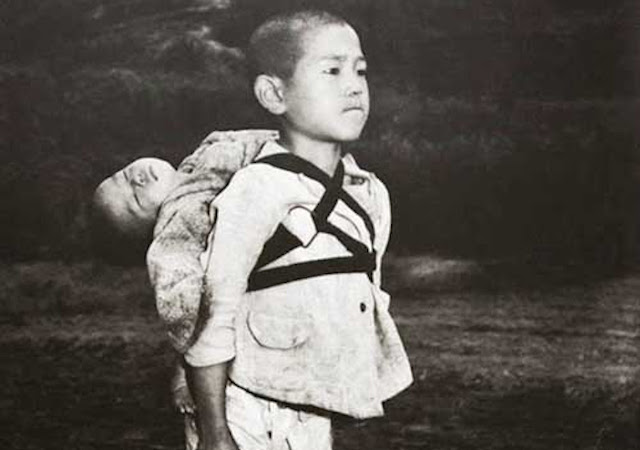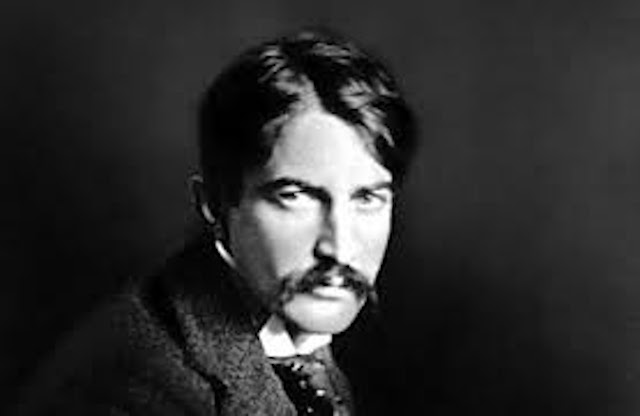While
surfing the internet, I came across this picture and wondered what it really
would be. Apparently, I could not see anything wrong with the photo; a Japanese
boy is in attention position while keeping a baby fasten to his back. I have
seen in films that Japanese hold their babies like this. The child’s face looks
patriotic and does not show any emotion. He must be listening to the national
anthem and his brother or sister must be sleeping well, that’s what I thought.
Then I read
the lines underneath it and my heart started aching. Suddenly, my mind came to
the poem ‘War is Kind’ by Stephen Crane in an ironical tone criticizing the
grim truth of loss in war. As the photo, outer world only sees the glory in it
but the real face of war is not at all a beautiful one. Well, back to the
photo, do you know that boy is carrying his own brother’s dead body on his
shoulder to be cremated at a mass cremation site? Shocking, isn’t that so?
During the World War II, Hiroshima and Nagasaki were blown into dust by a
nuclear attack. Mountain of people lost their lives whom cremated in mass cremation
sites. This boy was also waiting without any emotion in attention position
until the officers take his brother to fed the fire set by war. Where would his
parents might be? Why doesn’t he show any emotions? Parents might be killed by
the atomic wave and he seems not old enough to understand anything or he must
be in a state of emotional comma. How kind war are you to take my younger
brother, you must be telling me not to cry because that is the nature of war!
My question is would you still see any glory in the photo? Probably not. War
cannot give glory; it only can give pain to ordinary people who are the
ultimate victims of war. Stephen Crane too is telling us this very truth.
from War is Kind ["Do not weep, maiden, for war is kind"]
By Stephen Crane
Do not
weep, maiden, for war is kind.
Because
your lover threw wild hands toward the sky
And the
affrighted steed ran on alone,
Do not
weep.
War is
kind.
Hoarse, booming drums of the regiment,
Little souls who thirst for fight,
These men were born to drill and die.
The unexplained glory flies above them,
Great is the battle-god, great, and his
kingdom—
A field where a thousand corpses lie.
Do not
weep, babe, for war is kind.
Because
your father tumbled in the yellow trenches,
Raged at
his breast, gulped and died,
Do not
weep.
War is
kind.
Swift, blazing flag of the regiment,
Eagle with crest of red and gold,
These men were born to drill and die.
Point for them the virtue of slaughter,
Make plain to them the excellence of
killing
And a field where a thousand corpses lie.
Mother
whose heart hung humble as a button
On the
bright splendid shroud of your son,
Do not
weep.
War is
kind.
Poet is addressing
three persons in the poem: a young maiden whom lost her boyfriend, a baby whom
lost its father and finally a mother whom lost her son. The poet shows the
ironical words thrown at those to console them: “Do not weep, … for war is kind”
The letters they receive telling the loss of their soldier beloved, father or
son tell them to be proud of the dead soldier for he died for his country
safeguarding others. The poet is ironically questions is that true? or are
those soldiers had a glorified death in the battle field? He introduces the
disturbing scenes like a movie, step by step how the soldiers die with severe
pain and agony. The pain of the living one is not seen by anyone whom carry the
pain of loss forever.
He
critically points out whom become the victims of the glorified war, mostly the ‘little
souls’, the young inexperienced ones who runs after glory. Poet further shows
what are the things that attract them – the glorified war boom, flags and uniforms
and the lessons that tell them ‘the virtue of slaughter’ probably to safeguard his
own beloved ones. Crane shows that there are more beloved souls behind a
soldier who would suffer his loss. He asks the reader to see the untold,
invisible pain in their hearts.
The poet
questions the ‘unexplained glory’ of war. He questions what really is there to
glorify the war? Soldiers are not heroes but victims amid of devastating
weapons used in warfare. They never receive a glorified death in the war. They
are brain washed to be killing machines and when they meet opponent killing machine,
they both practice their ‘drill and die’ formula. Poet wants the reader to see
this futility of war.
The poet is
questioning the ‘virtue of slaughter’ and asks where would one find glory in ‘a
field where a thousand corpses lie’ This is the unseen real face of war which
can only offer death and pain to everyone who are in and off the battlefield.
He asks the reader to see the suffocated tears in the eyes of the victims of
war for whom war has not been kind. His ironical lines urges reader to see the
grim reality of war and ask the world not to go for a futile war which is never
kind.
You may like to read: Analysis of War is Kind by Stephen Crane
What is your idea of war? Have you any ideas related to this poem? Please comment below and join the discussion.









3 Comments
A good analysis for students
ReplyDeletethanks, nice to hear that.
Deleteyour grammar is incorrect in several places
ReplyDelete